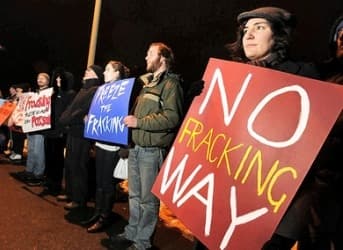Why would France suddenly prohibit shale gas exploration? Sure, there are environmental issues with horizontal drilling and hydraulic fracturing, the methods used to extract gas from porous shale deep underground: flammable drinking water, earth quakes, cows that die, radioactive sludge in sewage treatment plants.... But French governments have had, let’s say, an uneasy relationship with environmentalists.
No, there must have been another reason why the government of Nicholas Sarkozy prohibited shale gas exploration in 2011, after having already issued permits in 2010. A mini hullabaloo had broken out, stirred up by the European Ecologists and The Greens (EELV), the fringe on the French left. And Sarkozy caved! Without a fight! Enthusiastically. The government of François Hollande just confirmed the prohibition when Environment Minister Delphine Batho declared: “Hydraulic fracturing remains and will remain prohibited.”
The clue: Sarkozy suddenly visited Japan on March 31, 2011, a couple of weeks after the horrific earthquake and tsunami, and the subsequent nuclear accident at Fukushima, to declare in front of shell-shocked Japanese that there was “no alternative” to nuclear power.
He’d been dispatched by the almighty state-owned nuclear industry to tamp down on the growing anti-nuclear sentiment at home. Owned by the government, nuclear power plants produce 75% of France’s electricity and export some of it. No one who wants to be politically viable is allowed to hamper the industry. If someone strays off the reservation, he or she is dragged back soon. While Hollande campaigned on a vague promise to reduce dependency on nuclear power to 50%, it was understood as one of the bones he had to toss to environmentalists. Nothing would come of it.
So when Batho, who wants to add more renewables to the portfolio, toed the party line by saying, “Nuclear power is an industry with future,” then qualified it with a “but,” it caused an outcry even among the Socialists. That’s the power the nuclear industry has over the political machines.
But now another powerful entity turned up: Russia’s Gazprom. It’s the world’s largest gas producer, gas exporter, and gas distribution company with nearly 100,000 miles of gas trunk lines and branches. The Russian government owns 50.01% of it. At home, it has to sell gas under cost, one of the Soviet leftovers. It relies on high-profit sales from Europe to make up for it. But Europe is diversifying away from its single most important supplier.
Competitors include Russia’s number two, Novatek, and Norway—the second largest natural gas exporter in the world. So, in April, Gazprom had to lower its European sales guidance for 2012. Its market share in Europe was 27% last year, and it’s shooting for 30% by 2020, but if the US shale-gas boom ever infects Europe, those plans would become a pipedream—and if the high-profit sales from Europe tapered off further, it would have to raise prices at home, a political nightmare. Hence its fight by hook or crook against shale gas in France.
Gazprom’s “underhanded tactics” and “scaremongering about a new technology” have Moscow’s nod of approval and are designed to dissuade governments from developing their own shale-gas reserves, according to a report by Platts, a global provider of information on energy, petrochemicals, and metals. Efforts include all manner of operations, online and through encouraging demonstrations, but also paying public relation firms to spread “myths and misconceptions,” said Aviezer Tucker, assistant director of the Energy Institute at the University of Texas. A “European Union-wide ban” on shale-gas production, he said, would be the “holy grail.”
With France already knocked off, Sergei Komlev of Gazprom Export has been bouncing around the world in his fight against European shale gas. At a meeting in Qatar, according to Platts’ report, he gave a presentation. “Multiple Handicaps Will Retard Shale Gas Development Outside US” was the title of one of his slides. “Fortunately, it claimed, “European shale gas development faces numerous economic, regulatory, and political barriers before there are significant amounts of shale gas production, not sooner than in ten or more years.”
Breathing room for Gazprom in the natural gas wars.
ADVERTISEMENT
In the US, natural gas may be the most mispriced commodity these days. Its price has been below the cost of production for so long that the industry is suffering billions in losses. But demand for natural gas by power producers has been booming—and it’s killing coal, one powerplant at a time. Read.... Natural Gas Is Pushing Coal Over The Cliff.
By. Wolf Richter


















